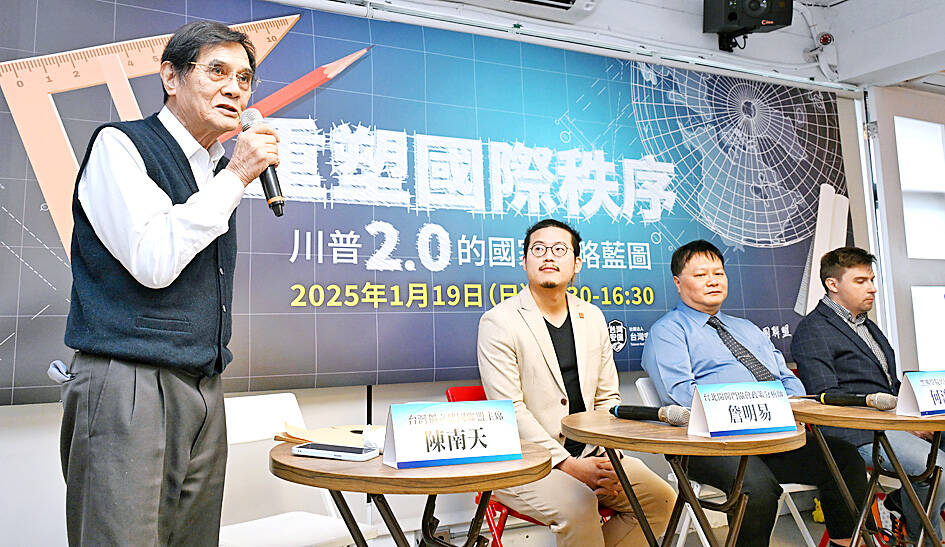Taiwan’s leading edge in semiconductors and other high-tech sectors would play a very important role in forging stronger alliances with democratic countries, headed by incoming US president Donald Trump, to counter the authoritarian regimes of China and Russia, experts said at a forum in Taipei yesterday.
Once he is inaugurated, it would be “Trump 2.0,” World United Formosans for Independence chairman Richard Chen (陳南天) said.
Trump has appointed a new slate of people to take charge of strategies to “reshape the world order,” as current world economies, international relations and wars are very different from those of his first presidency in 2017 to 2021, Chen said.

Photo: Fang Pin-chao, Taipei Times
Trump’s central tenets are “America First” and “Make America Great Again,” which won the support of disenchanted US voters who want industries and jobs to return home to drive new economic growth, Kuma Academy (黑熊學院) cofounder Ho Cheng-hui (何澄輝) said.
“During the campaign, Trump focused on the social instability and insecurity of Americans, brought on by the flood of illegal immigrants, and fentanyl and similar opioid drugs pouring into US. Trump wanted to ensure control by appointing a ‘border czar’ and threatening Canada and Mexico with higher tariffs so they would employ stricter enforcement at their borders with the US,” Ho said.
Trump and the Republicans also criticized Washington, saying it had not faced up to China’s rise as a world power. China has registered growth in its economy, industries, new technologies and military build-up over the past decades, and is challenging the US’ leadership on the global stage, he said.
“Trump has stated his position on these issues and pointed to China as the largest threat to US interests, especially in the Indo-Pacific region. Much of Trump’s new geopolitical strategies are aimed at countering China’s rise and its military expansionism,” Ho said.
Experts agreed that Trump and his new administration would forge a much stronger alliance of like-minded democratic countries, where Taiwan would have a pivotal role, given its central position in the “first island chain,” and its leading edge in semiconductors, artificial intelligence (AI) and computer electronics industries.
The US and Western nations would rely on Taiwan for new high-tech products, electric vehicles and smart military weapons, they said.
Taiwan National Security Institute research fellow Stanislaw Kwiatkowski said that the people Trump appointed to offices that handle foreign affairs and have a direct impact on Indo-Pacific strategies were mostly China hawks who have been friendly to Taiwan and have espoused a tougher stance on US dealings with China.
Trump has sought to end the fighting in the Middle East and to pivot US geopolitical strategy and foreign policy initiatives to the Indo-Pacific region to face China’s rising power, he said.
The US would also seek closer partnerships with Japan, South Korea, Taiwan and India to counter Chinese military expansion and conflict, Kwiatkowski added.
Taiwan would have an even closer relationship with the US and have an enhanced democratic alliance, since Trump, Washington officials and European partners have realized Taiwan’s importance in the supply chain and production of semiconductors, AI technologies and smart weapons, he said.
Countries would want to have a good relationship with Taiwan in the expected economic and trade war, and work together on deterring the so-called “axis of upheaval” — China, Russia, Iran and North Korea, he added.

Beijing could eventually see a full amphibious invasion of Taiwan as the only "prudent" way to bring about unification, the US Department of Defense said in a newly released annual report to Congress. The Pentagon's "Annual Report to Congress: Military and Security Developments Involving the People's Republic of China 2025," was in many ways similar to last year’s report but reorganized the analysis of the options China has to take over Taiwan. Generally, according to the report, Chinese leaders view the People's Liberation Army's (PLA) capabilities for a Taiwan campaign as improving, but they remain uncertain about its readiness to successfully seize

Taiwan is getting a day off on Christmas for the first time in 25 years. The change comes after opposition parties passed a law earlier this year to add or restore five public holidays, including Constitution Day, which falls on today, Dec. 25. The day marks the 1947 adoption of the constitution of the Republic of China, as the government in Taipei is formally known. Back then the Chinese Nationalist Party (KMT) governed China from Nanjing. When the KMT, now an opposition party in Taiwan, passed the legislation on holidays, it said that they would help “commemorate the history of national development.” That

Trips for more than 100,000 international and domestic air travelers could be disrupted as China launches a military exercise around Taiwan today, Taiwan’s Civil Aviation Administration (CAA) said yesterday. The exercise could affect nearly 900 flights scheduled to enter the Taipei Flight Information Region (FIR) during the exercise window, it added. A notice issued by the Chinese Civil Aviation Administration showed there would be seven temporary zones around the Taiwan Strait which would be used for live-fire exercises, lasting from 8am to 6pm today. All aircraft are prohibited from entering during exercise, it says. Taipei FIR has 14 international air routes and

Snow fell on Yushan (Jade Mountain, 玉山) yesterday morning as a continental cold air mass sent temperatures below freezing on Taiwan’s tallest peak, the Central Weather Administration (CWA) said. Snowflakes were seen on Yushan’s north peak from 6:28am to 6:38am, but they did not fully cover the ground and no accumulation was recorded, the CWA said. As of 7:42am, the lowest temperature recorded across Taiwan was minus-5.5°C at Yushan’s Fengkou observatory and minus-4.7°C at the Yushan observatory, CWA data showed. On Hehuanshan (合歡山) in Nantou County, a low of 1.3°C was recorded at 6:39pm, when ice pellets fell at Songsyue Lodge (松雪樓), a